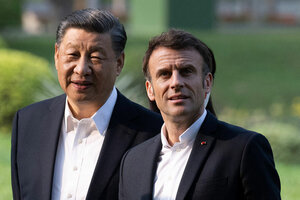In Ukraine, China won’t try to tip the scales – yet

Chinese leader Xi Jinping meets French President Emmanuel Macron during their summit in Guangzhou, China, on April 7, 2023. Mr. Xi turned down Mr. Macron's request that China try to persuade Russia to end its war in Ukraine.
Jacques Witt/Reuters
London
Now you see it, now you don’t. China has been dropping conflicting hints in recent weeks over how, when – and whether – it might wield its influence to try to shape the outcome of the Ukraine war.
But when Chinese leader Xi Jinping signaled during his summit last week with France’s President Emmanuel Macron that he had no intention of intervening diplomatically to persuade Moscow to “see sense,” he brought one critical element into sharp focus.
It is the North Star principle by which Mr. Xi will ultimately decide his Ukraine policy.
Why We Wrote This
China could give Russia new weapons or persuade the Kremlin to negotiate an end to the Ukraine war. Beijing’s actions will reflect its key goal – to ensure Russia does not lose and thus hand victory to the West.
Put simply, while Russia may fail to win the war, it is in China’s core interest that Vladimir Putin should not lose it outright.
And the reason that is a core interest may explain why Mr. Xi has held off making a move to tip the scales – as well as the contradictory signals China has been sending out over the past several months.
It’s because the interest is rooted in Mr. Xi’s core vision of a “Chinese century” in which his nation will supplant America as the world’s dominant power.
When it comes to Ukraine, he has concluded that a comprehensive Russian defeat would inevitably strengthen the United States and its Western allies.
Yet he has also been juggling other key elements in his vision of China’s ascending influence: a relationship with Russia that is more complex and constrained than it might appear, and Beijing’s ties with its two top trade partners, the European Union and the U.S.
Mr. Macron’s lavish welcome in Beijing – he was the third EU visitor in recent months, following trade pilgrimages by the leaders of Germany and Spain – left little doubt of the importance Mr. Xi attaches to safeguarding and strengthening China’s relationship with America’s European allies.
It is more than a matter of trade and economic growth. Hosting high-profile European visitors holds an added political attraction: By encouraging ambitions in some European capitals – notably Paris – for a “third way” foreign policy independent of Washington, Mr. Xi hopes to drive a wedge into the transatlantic alliance.
All of these elements have figured in Mr. Xi’s lengthy search for an answer to the questions of how, when, and whether to involve China more actively in breaking the stalemate in Ukraine.
It is Russia that matters most, but only in the sense that staving off an unvarnished, humiliating Russian defeat is Mr. Xi’s bottom-line aim.
That, more than the “no limits” partnership he and Mr. Putin unveiled just days before the Russian invasion, is what has been motivating China’s Ukraine strategy. For while the relationship is important to both sides, Russia is very much the junior partner.
China has not criticized, much less condemned, the invasion. But it has not endorsed the war either. When Mr. Putin recognized new “independent republics” in Russian-held eastern Ukraine, China did not follow suit. And Beijing abstained from a U.N. General Assembly vote denouncing Mr. Putin’s war on the first anniversary of the invasion.
It appeared then that Mr. Xi was poised to get more actively involved in trying to find a way out of the war.
While the U.S., citing intelligence reports, warned he might be about to resupply and arm Mr. Putin’s battered military, Mr. Xi’s preferred option was apparently to wade in diplomatically.
Mr. Xi sent his top foreign policy envoy, Wang Yi, to the annual Munich Security Conference in Germany with a twin message: that China, post-lockdown, was eager for reinvigorated trade with Europe; and that the Europeans, in their own interest, should peel themselves away from the U.S.-led drive to arm Ukraine, which would only prolong the war.
In the presumed opening act of a Chinese diplomatic effort to bring the warring parties together, the envoy said Mr. Xi was poised to deliver a major “peace speech” a few days later.
But the peace speech never happened. The overture to European leaders had been met with united condemnation of Russia’s war, and an insistence that any diplomatic deal would require Mr. Putin to pull out all his invasion forces – the kind of Russian defeat that Mr. Xi wants to avoid.
The Europeans also echoed U.S. warnings against supplying Mr. Putin with weapons – a message reportedly reiterated by Mr. Macron last week.
None of this means that either option – arms supplies or diplomacy – is necessarily off the table.
But the paramount importance Mr. Xi attaches to preventing a worst-case outcome for Mr. Putin suggests that the situation on the ground will determine which of those options China chooses, and when.
“China,” declared a Macron aide before his visit, “is the only country in the world capable of having an immediate and radical impact on the conflict, in one direction or the other.”
That is true, if only because China is both Russia’s closest friend and Ukraine’s valued trade partner. It is also a role very much in keeping with Mr. Xi’s view of China as an ascending world power.
Yet, however “immediate” China’s influence could prove, it’s clear that it will be deployed at a time of Mr. Xi’s careful choosing.

